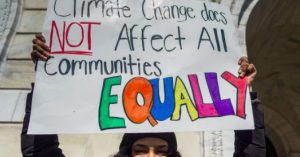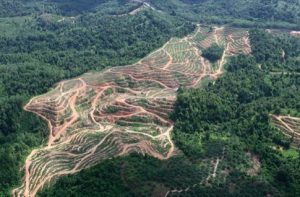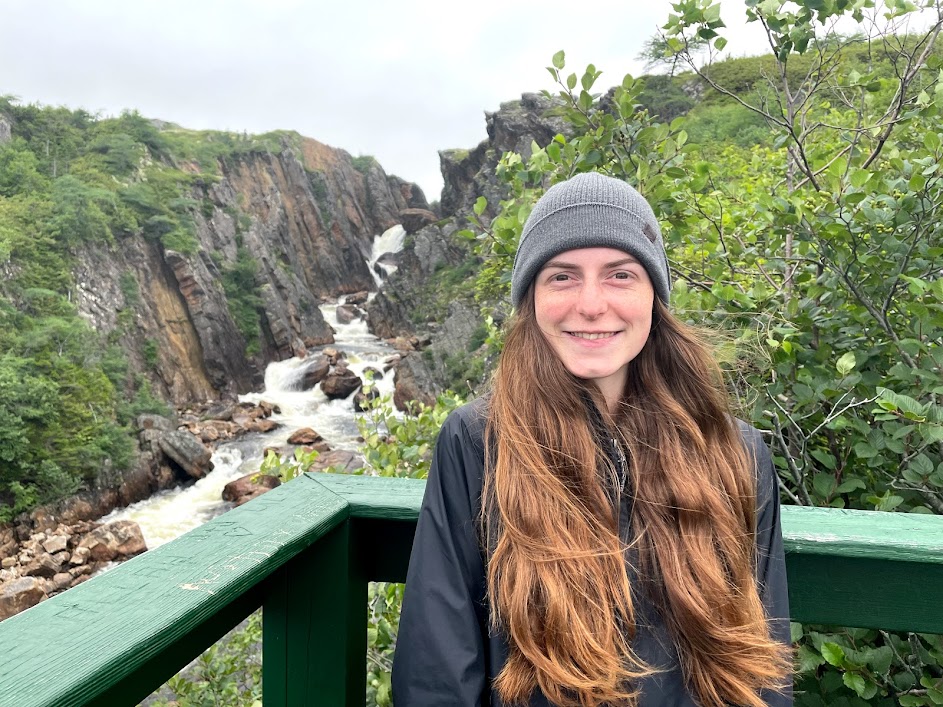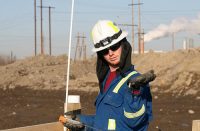National Climate Action is a Win for Women

Source: Mother Jones
The Greenhouse Gas Pollution Pricing Act is a win for women and girls across Canada since they often bear the brunt of climate change impacts. Climate change negatively enhances gender inequalities and poses greater risks to females.
“The climate crisis will impact everyone, but individuals and groups that already face systemic inequality will be disproportionately impacted, since climate change can exacerbate existing inequalities and create new forms of discrimination,” says Nathalie Chalifour, Co-Counsel for the National Association for Women and the Law and Friends of the Earth. “Women have unique vulnerabilities to some climate change-related health impacts, like heat stress, but they are also disproportionately impacted by climate change due to gendered social and family roles, lower average incomes, and existing discriminatory policies and cultural attitudes.”
“Women are also at risk of experiencing an increased strain and workload caring for sick or injured family members in the context of climate-related extreme weather events,” says Co-Counsel, Anne Levesque. “This increased strain can translate to less participation by women in the workforce, a trend Canada has already seen in the fallout of COVID. As well, violence against women often flares up in the aftermath of natural disasters, the frequency and severity of which will be greater as a result of climate change.”
The Act is a necessary step for Canada to largely reduce its GHG emissions as it requires a minimum national level of carbon pricing across the country, ensuring that all Canadian governments are taking climate action. These actions are critical for Canada to meet its Paris Agreement goal to reach net-zero emissions by 2050.
The Supreme Court of Canada (SCC) approved the Act as they recognize that climate change is threatening humanity disproportionately. The SCC noted that certain communities in Canada are more vulnerable than others, and the Act needs to be in place to help protect the people who are most at risk. They also note that carbon pricing can also generate revenue that can be partially used to support equality groups for women and girls.
This Act is considered a victory for women and girls across Canada. It is a step in the right direction of addressing climate justice and highlighting the work that this country needs to do to support gender equality, protect women and girls, and address the intersections of environmental and social issues.
Shrinking Penises and Low Fertility in Women – Blame Pollution

Source: Unsplash
Well look how the tables turned, perhaps those who dismiss climate change might have something to worry about now – as the planet is getting hotter and changing by the minute, it is taking penises down with it. While effects have been seen on animals already, such as the damaged polar bear penises to limp dick in otters, we humans have not slipped through the cracks on this one.
Dr. Shanna Swan – an environmental and reproductive epidemiologist points out that the chemicals we use not only hurt our planet but contribute to smaller penis size, low sperm count, and erectile dysfunction. This screams that we are literally creating our own extinction before our eyes.
The comparison between sperm counts and fertility rates between our generation to those of our grandparents varies quite a bit; Swan explains that a man might now half half the sperm count of his grandfather.
Not only are we driving our own downfall here, we are bringing the libidos down too. The relationship between the amount of phthalate levels (commonly found in plastics) and sexual satisfaction rates show that there is a decrease in sexual desire. Also, endocrine disruptors lead to all sorts of problems – the chemicals can be found in plastics, herbicides, toothpaste, and beauty products. It also passes to children through placenta in pregnancy and then they are exposed again when they reach adult age. So for the love of lovemaking, babies, and libidos, let’s ditch the plastics.
Why Palm Oil Deforestation is Seriously Harming Our Planet

Malaysia // Source: Mongabay.com
As we approach Earth Month (April 2021), it is important to widely publicize climate issues that have, and continue to have, serious impacts on the environment. Let’s talk palm oil deforestation. Grown only in the tropics, the oil palm tree produces high-quality oil, which was once used primarily for cooking. Although palm oil is a tiny part of the North American diet, more than half of all packaged products we consume contain palm oil. The following list are just some examples:
- Bread
- Crisps
- Soap
- Ice Cream
- Shampoo
- Chocolate
- Biscuits
- Make Up
But it’s not just North America. Of all the palm oil that now goes into food in Europe and the US, Asia uses far more: India, China, and Indonesia account for nearly 40% of all palm oil consumed worldwide. Where they once cooked with soya oil, palm oil has replaced it. Our global dependence on palm oil has devastating consequences. According to the UN Food and Agriculture Organization, small amounts of palm oil are grown in many countries, but the global market is dominated by only major players: Indonesia and Malaysia. Malaysia has lost roughly 90% of its original rainforest lands, most of which have been lost in the 30 years since we began consuming palm oil in so many products. In 2014-2015, Indonesia lost 1.9 million hectares to palm oil deforestation.
Some recent figures came out at the beginning of March, which show that deforestation in Indonesia hit record lows in 2020, allowing the country to maintain its total forest cover by 50.6%. According to a recent study (not yet peer reviewed), a price decline of 1% was associated with a 1.08% decrease in new plantations and a 0.68% decrease in forest loss. But make no mistake, this issue still persists, and experts are saying that Indonesia could easily end up like Brazil if it’s not careful. Between 2004 and the early 2010s, annual forest loss in Brazil, home to nearly two-thirds of the Amazon’s forest cover, declined by roughly 80%. The decline was driven by a number of factors, including increased law enforcement, satellite monitoring, pressure from environmentalists, private and public sector initiatives, new protected areas, and macroeconomic trends. However, Brazil’s forest loss has increased steadily (and alarmingly) since 2012.
Why is losing mass amounts of forest so bad? First of all, fires are set to clear forests and land for palm oil crops, which are responsible for much of Indonesia’s GHG emissions. Much of the land being destroyed in Southeast Asia is land that the indigenous peoples have lived off of for centuries. A report by the Human Rights Watch examines how a patchwork of weak laws, exacerbated by poor government oversight, and the failure of oil palm plantation companies to fulfill their human rights responsibilities have adversely affected Indigenous peoples’ rights to their forests, livelihood, food, water, and culture. Palm oil is also destroying the habitat of endangered species like the Orangutan, Pygmy elephant and Sumatran Rhinoceros. Orangutans whose habitats have been destroyed often enter villages and oil plantations in search of food where they are captured or killed by farmers who treat them as pests. So, what can we, as consumers, do to help? Shop responsibly by choosing to make informed shopping choices and buy products that are palm oil free, and use your voice to support palm oil labelling, sign petitions, and write to companies and manufacturers that use palm oil in their products, urging them to remove palm oil from their ingredients completely.
Rallying Against Environmental Racism: Highway Development in Texas Halted

Source: Houston Public Media
On March 23, 2021, Harris County, Texas sued the Texas Department of Transportation (TxDOT) for the development of a highway in the state that would further amplify air pollution, specifically in black and brown minority neighborhoods.
The development of the I-45 highway would also separate over 1000 low-income black and brown families. This statistic does not include the variety of minority-owned businesses, local schools, and other community establishments that would also be forced to relocate or to shut down entirely.
Furthermore, the congregation of traffic and other highway services in the county would most definitely increase the amount of air pollution and possibly cause flooding. The brunt of this impact would be felt by Harris Country citizens, with no consideration for remediating or protecting these people from such consequences.
The Biden administration and the Federal Highway administration have written a letter to the project leads at TxDOT, to stop any further construction of this road in Harris county. The letter expresses that further investigation and review must occur in the development of the highway. The letter acknowledges the complaints made by residents and suggests that undue harm might be caused to these people.
This issue raises further concern on how minority and marginalized groups are being affected in the United States by the continued growth of infrastructure that sets to harm and divide these communities. Moreover, it further builds on the ever-prevalent problem of air pollution and other environmental issues.
Dear Sports, Drop the Carbon Sponsorship Deals

Source: Unsplash
There are over 250 sponsor agreements around the globe between sports groups and carbon intensive industries. There have been urges made to drop such sponsorship agreements between teams and competitions which promote a high carbon lifestyle.
Ultimately, this normalizes carbon intensive lifestyles and overlooks the need to step up for climate change action. A report published by New Weather Institute think tank, climate charity Possible and the Rapid Transition Alliance, called “Sweat Not Oil”, examined thirteen sports and concluded that football lands as the worst offender for most carbon deals. A count of 57 in total globally, ranging from stadium naming rights being sold to fossil fuel giants, in addition to airline and automotive companies.
The study also compares pollution and burning fossil fuels to tobacco – which was banned from sports advertising in 2003. As sports has the ideology to bring people together and inspire, if it is not used in the righteous way, it sends out the wrong message to the audience. Tobacco was cut off from advertising to protect public health, and the same ideology should apply to pollution and climate change. If more sustainable partnerships with greener companies would step up and lead the change, there would be a transformation in the industry as a whole – for the better of us and the planet.
A Canada-U.S. Partnership Gives Hope to the Monarch Butterflies

Source: Pixabay
This past year has been challenging for eastern Monarch butterfly populations in North America. But there is a group that is dedicated to helping this species thrive by recovering and protecting the habitat of their migratory route – the U.S. Rights-of-Way as Habitat Working Group.
The U.S. Rights-of-Way began in 2015, facilitated by the Energy Resources Center at the University of Illinois Chicago, and has established a huge network of collaborators and organizations across sectors – including the gas, electric, and rail and road industries. This group has done amazing work restoring natural habitats, enhancing the safety of transportation and energy systems, and supporting wildlife and pollinators.
Now, Canada is joining this initiative! The Canadian Wildlife Federation (CWF) has recently announced that they are launching a Canadian chapter of the Rights-of-Way in partnership with the U.S. group.
“What we have learned as a working group over the past five years is that we can really multiply our conservation benefits by working together, and there’s never been a more important time to focus on solutions to address biodiversity loss,” said Iris Caldwell, program manager of sustainable landscapes, Energy Resources Centre at the University of Illinois Chicago.
The hope is that this collaboration will strengthen conservation and restoration efforts across the Canadian-U.S. border to facilitate knowledge sharing and join forces in developing innovative nature-based solutions to climate change in North America.


Greta Vaivadaite is a Journalist, Online Editorial and Social Media Coordinator at Alternatives Media. Greta has completed her undergraduate studies at York University in Environmental Management, and completed her Masters of Environment and Sustainability at Western University in 2020. Her professional interests lay in advocating for environmental education, sustainable fashion, and a greener travel industry.













